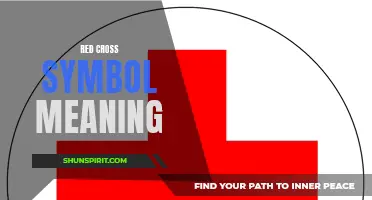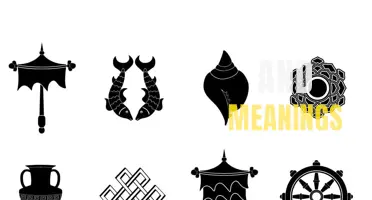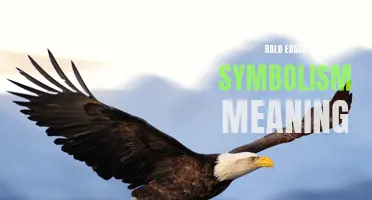
Deer, with their graceful presence and gentle demeanor, have long been admired by humans throughout history. Behind their physical beauty lies a deeper symbolism that has captured the imagination of cultures around the world. In many mythologies and spiritual traditions, the deer represents qualities such as grace, intuition, innocence, and spirituality. These symbolic meanings have been associated with the deer for centuries, weaving a rich tapestry of significance that continues to resonate with us even today. Whether seen in dreams, encountered in the wild, or depicted in artwork, the deer remains a potent symbol that reminds us to connect with our own inner wisdom and navigate life's challenges with grace and mindfulness.
What You'll Learn
- In which cultures or religions is the deer considered a symbol of strength or power?
- What does the deer symbolize in Native American folklore?
- How is the deer commonly portrayed in mythology and folklore around the world?
- Are there any specific qualities or traits associated with the deer as a symbol?
- What significance does the deer hold in spiritual or mystical beliefs and practices?

In which cultures or religions is the deer considered a symbol of strength or power?
In many cultures and religions around the world, the deer is considered a symbol of strength and power. This majestic animal has often been associated with various attributes such as grace, agility, and beauty. Let's explore some of the cultures and religions where the deer holds such symbolism.
In ancient Greek mythology, the deer was associated with the goddess Artemis, who was the goddess of hunting and the protector of the wild. According to Greek mythology, Artemis would often transform herself into a deer to move swiftly and silently through the forests. As such, the deer became a symbol of her strength and agility.
In Native American cultures, the deer is believed to possess spiritual power and is often seen as a sacred animal. Many tribes consider the deer to be a messenger of the gods and a symbol of intuition and sensitivity. The deer is also associated with the idea of abundance and providing sustenance to the tribe.
In the religion of Buddhism, the deer holds a special significance. It is believed that Gautama Buddha delivered his first sermon in a deer park, known as Sarnath. Therefore, the deer is seen as a symbol of the Buddha's teachings and enlightenment. Additionally, in Buddhist art, the deer is often depicted as accompanying the Buddha, representing spiritual power and compassion.
In Chinese culture, the deer is associated with longevity and immortality. The deer is often portrayed alongside other mythical creatures in Chinese art and is believed to live for thousands of years. It is also considered a symbol of prosperity and good fortune.
The deer also plays a significant role in Celtic mythology. The stag, which is a male deer, is associated with the god Cernunnos, who is often depicted with antlers. The stag symbolizes strength, virility, and the cycle of death and rebirth.
In conclusion, the deer is considered a symbol of strength and power in various cultures and religions around the world. From Greek mythology to Native American beliefs to Buddhism and Chinese culture, the deer holds a special significance and is often associated with attributes such as grace, agility, and spirituality. Whether as a representation of a deity or as a symbol of abundance and longevity, the deer continues to inspire and hold a special place in the hearts of many people across different cultures.
Exploring the Symbolic Meaning of Apples: From Forbidden Fruit to Wholesome Nourishment
You may want to see also

What does the deer symbolize in Native American folklore?
When it comes to Native American folklore, one animal that holds significant symbolism is the deer. The deer is a widely recognized animal in indigenous cultures across North America, and it carries a range of meanings and symbolism.
In many Native American tribes, the deer symbolizes gentleness, grace, and sensitivity. The deer is known for its elegant and swift movements, which are often associated with gracefulness. Native Americans see these traits as positive and aspire to embody them in their own lives. The deer's ability to move quickly and gracefully through the forest also represents their connection to the natural world and their intuition.
Furthermore, the deer is often associated with harmony and balance. Native Americans believe that the deer helps maintain the balance between humans and nature. The deer's natural instinct is to avoid danger and live in peace, which serves as a reminder to Native Americans to live in harmony with their surroundings and to respect all living beings.
In some Native American tribes, the deer is also linked to fertility and abundance. The deer's swift reproduction and the nurturing nature of its female counterpart, the doe, symbolize fertility and the ability to provide for one's community. This symbolism is especially prominent in tribes that relied heavily on hunting and gathering for their sustenance.
The deer has also been linked to spirituality and visions in Native American folklore. Some tribes believe that encounters with deer or sightings of deer can serve as messages or signs from the spiritual realm. These encounters are seen as auspicious and can provide guidance or insight into one's life path.
Additionally, Native American tribes often use deer-related imagery in their rituals, ceremonies, and art forms. The deer is frequently depicted in traditional dances, songs, and crafts to honor and invoke the spirit of the animal. In these contexts, the deer symbolizes strength, agility, and resilience, qualities that the Native American people admire and seek to cultivate.
In conclusion, the deer holds a prominent place in Native American folklore and symbolizes various qualities such as gentleness, grace, harmony, fertility, and spirituality. Its presence in indigenous cultures reflects the deep connection between Native Americans and the natural world, as well as their reverence for the animals they share their environment with. The symbolism of the deer continues to be a significant part of Native American traditions and serves as a reminder of the values and beliefs held by these communities.
Unveiling the Mystical Meaning Behind the Native American Spiral Symbol
You may want to see also

How is the deer commonly portrayed in mythology and folklore around the world?
Deer are magnificent creatures that have captivated the imaginations of people around the world for centuries. These graceful animals have played significant roles in various mythologies and folklore across different cultures. Let us dive deeper into how the deer is commonly portrayed in mythology and folklore.
In many cultures, the deer is associated with various gods, goddesses, and mythical figures. In Greek mythology, the deer was sacred to Artemis, the goddess of the hunt. It was believed that she would transform into a deer herself to escape the pursuit of unwanted suitors. Additionally, in Norse mythology, the deer was linked to Freyja, the goddess of love and fertility. It was said that she had a chariot pulled by two giant deer that symbolized her connection with nature and the wild.
In Celtic folklore, the deer was considered a mystical creature that possessed otherworldly powers. It was believed that encountering a deer in the forest could lead to a journey into the realm of the fairies or an encounter with a spirit guardian. The deer was seen as a symbol of grace, elegance, and spiritual guidance.
In Native American cultures, the deer is revered as a sacred animal that represents gentleness, intuition, and sensitivity. Many tribes associate the deer with healing and have rituals that involve connecting with the spirit of the deer to seek inner wisdom and harmony with nature. The Cherokee, for example, believe that the deer brings good fortune and protection to those who show respect and gratitude towards it.
In Chinese mythology, the deer is associated with longevity and immortality. It is believed that the deer possesses a special herb called "lingzhi" that can grant immortality to those who consume it. The imagery of the deer is often depicted in traditional Chinese artwork to convey wishes of long life and prosperity.
Throughout various mythologies and folklore, the deer is often seen as a symbol of wisdom, renewal, and the connection between the earthly and spiritual worlds. Its gracefulness and ability to move swiftly through the forest has led to its association with agility and adaptability.
The deer also appears in many folktales and legends, often serving as a guide or helper to the protagonist. In Japanese folklore, the deer is portrayed as a messenger of the Shinto gods and is known to lead lost travelers out of danger. In the legend of the "Golden Deer," a magical deer leads the hero to a hidden treasure that brings prosperity and good fortune.
Overall, the portrayal of deer in mythology and folklore varies across different cultures but often highlights their elegance, spirituality, and mythical powers. These graceful creatures continue to inspire awe and wonder in the hearts of people worldwide, reminding us of the deep connections between nature and the supernatural.
Decoding the Language of Gang Graffiti: Unraveling the Symbols and Meanings
You may want to see also

Are there any specific qualities or traits associated with the deer as a symbol?
Deer are fascinating creatures that have long been associated with various symbols and meanings. In many cultures around the world, deer are seen as powerful and graceful animals, embodying various qualities and traits. Here are some of the specific qualities and traits associated with the deer as a symbol:
- Gracefulness: One of the most prominent qualities associated with deer is their gracefulness. Their elegant movements and agile nature are often seen as symbols of beauty and poise. Deer are known for their ability to move through forests with ease and without disturbing the environment, which further adds to their graceful image.
- Vigilance: Deer are known for their keen senses and constant alertness. They are always on the lookout for potential danger and can quickly react to any threats. As a result, they are often seen as symbols of vigilance and awareness. In many cultures, the deer symbolizes the importance of being aware of one's surroundings and staying vigilant in the face of challenges.
- Gentleness: Deer are typically peaceful animals that avoid conflicts whenever possible. They are known for their gentle and non-aggressive demeanor, which has led them to be associated with qualities such as kindness and compassion. The deer as a symbol often represents the importance of embracing these qualities and treating others with warmth and gentleness.
- Sensitivity: Deer are highly sensitive creatures that can easily sense changes in their environment. They have acute hearing and sense of smell, which enables them to detect even the slightest noises or scents. This sensitivity has led many cultures to associate the deer with heightened intuition and the ability to perceive things that are not immediately apparent. As a symbol, the deer represents the importance of trusting one's instincts and being sensitive to subtle changes in one's surroundings.
- Spirituality: In some spiritual traditions, the deer is seen as a symbol of spirituality and connection with the divine. They are believed to possess a sense of inner peace and wisdom that can be accessed through quiet contemplation. Deer sightings or encounters are sometimes seen as messages from higher realms, guiding individuals on their spiritual path.
- Renewal and Rebirth: Another interesting symbolism associated with deer is that of renewal and rebirth. Deer shed their antlers annually, only to grow them back stronger and more magnificent. This process has led many cultures to view the deer as a symbol of rejuvenation and the cyclical nature of life. The deer's ability to adapt and thrive even after facing challenges is seen as an inspiration for personal growth and renewal.
Overall, the deer as a symbol encompasses various qualities and traits ranging from gracefulness and vigilance to gentleness and spirituality. Its significance in different cultures and belief systems highlights the universal appeal and fascination with these majestic creatures. Whether you encounter a deer in the wild or come across its image in art and literature, it is worth reflecting on the deeper symbolism associated with this remarkable animal.
Unlocking the Symbolic Meaning of the Nest: What Does It Represent?
You may want to see also

What significance does the deer hold in spiritual or mystical beliefs and practices?
The deer is an animal that holds great significance in various spiritual and mystical beliefs and practices across different cultures around the world. It is often seen as a symbol of power, grace, and spiritual insight. In many myths and legends, the deer is associated with deities and revered as a spiritual guide.
In Celtic mythology, the deer is associated with a powerful and revered figure called the Cernunnos. Often depicted with antlers, Cernunnos is the god of nature, fertility, and the animal kingdom. The deer symbolizes his connection to the wild and his ability to navigate between the realms of the living and the spirit world.
In Native American cultures, the deer is seen as a messenger and a symbol of spiritual enlightenment. The Deer Clan, for example, is one of the most respected clans in many tribes. Members of the Deer Clan are known for their psychic abilities and their ability to connect with the spiritual realm. In some tribes, the deer is also associated with healing and transformation.
In Eastern traditions, such as Buddhism and Hinduism, the deer is regarded as a sacred animal. In Buddhism, the deer is considered one of the Four Dignities, which represent different aspects of spiritual practice. The deer represents gentleness, compassion, and the ability to bring peace and harmony to oneself and others. In Hinduism, the deer is often associated with the god of love and desire, Kamadeva, who is believed to ride a deer.
In shamanic practices, the deer is considered a powerful spirit animal. Shamans believe that deer medicine represents the ability to move through life with grace and agility. They see the deer as a guide that can help them navigate the spiritual realms and uncover hidden wisdom and insights.
Overall, the deer holds great significance in spiritual and mystical beliefs and practices. It is associated with qualities such as grace, power, healing, and spiritual insight. Whether seen as a deity, a spiritual guide, or a messenger, the deer is a symbol that reminds us of our connection to the natural world and our ability to tap into higher realms of consciousness. By embodying the qualities of the deer, we can find balance, enlightenment, and spiritual growth in our own lives.
The Meaning Behind the Moon Symbol on Instagram
You may want to see also
Frequently asked questions
In many cultures, the deer is seen as a symbol of grace, beauty, and gentleness. In Native American cultures, the deer is often associated with spiritual growth and connection to nature. In Celtic mythology, the deer is believed to be a messenger from the otherworld, bringing messages of hope and renewal. In Chinese culture, the deer represents longevity, good luck, and prosperity. Overall, the deer is often seen as a positive symbol in various cultures around the world.
Dreaming about deer can have various meanings depending on the context of the dream. In general, the presence of a deer in a dream may symbolize intuition, gentleness, and grace. It may also represent a sense of connection to nature or the need to bring more peace and calmness into your life. Additionally, seeing a deer in a dream can sometimes be a reminder to stay vigilant and be cautious of potential dangers or obstacles.
Encountering a deer in a spiritual context is often seen as a sign of harmony, balance, and healing. It may indicate that you are on the right path and that you should trust your instincts and intuition. The deer's presence may also be a message to embrace your inner gentleness and to approach situations with grace and compassion. Overall, encountering a deer spiritually can be seen as a positive and uplifting symbol.
When a deer crosses your path, it is often seen as a symbol of serendipity and guidance. It may indicate that you are being led towards a path of peace, growth, and spiritual enlightenment. Some interpret the crossing of a deer as a message to pay attention to the opportunities and experiences that are presenting themselves to you in the present moment. It is a reminder to stay open and aware of the signs and synchronicities that may be guiding you towards growth and fulfillment.







